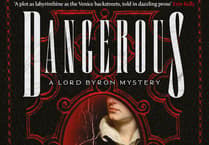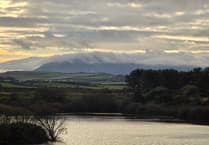Meet a pioneer of the online betting industry and now of virtual racing, Vincent Caldwell, the man who would love to bring horse racing back to the Isle of Man...
Vincent Caldwell was introduced to horses, and the betting industry, early in life.
His father Charles was a publican, hotelier and racehorse owner in Northern Ireland who started out training greyhounds and ended up owning racehorses. He started taking his son racing when he was 14.
Vincent recalls: ’I remember him pulling up to school at lunchtime and taking me out to go racing at Down Royal and Down Patrick and sometimes down to Fairyhouse.
’He was very often trying to get a few bets on and he couldn’t hit three bookmakers at the one time so he used me to cover two of them. That’s where I got the love of the game.’
At the age of only 19 Vincent was awarded the Northern Ireland franchise for Barcrest slot machines and in 1986 he got his first bookmaker’s licence, in Co Monaghan. Right from the start of his business career Vincent displayed a precocious talent for spotting lucrative new ideas
He says: ’We opened some shops in Co Monaghan and we opened some shops in Dublin and then my father bought a hotel and I took over the nightclub and ran discos.
’I first came to the Isle of Man around that time: I’d come over to do some work for my brother. It was a wintry November day and I went for shelter in the Villers Hotel and had my first drink ever, a vodka and coke.
’Then, in the afternoon, I walked down by Marks and Spencer and there was a disco going on and I thought: "Nobody’s doing that in Belfast, an afternoon disco - that’s a great idea."
’So I went back home and started an afternoon disco in Belfast and that boomed and that really was what got me started, thanks to the Isle of Man.’
Vincent’s five brothers and one sister were all following different professions: three of them were lawyers, one a doctor, one an accountant and another a chef. So when his father started to show signs of developing Alzheimer’s it was Vincent who took over the betting licences and hospitality venues.
He left Belfast in 1990 following a terrifying sectarian incident.
He recalls: ’I was married to a Protestant girl and I was a Catholic. There was lots of intimidation, lots of death threats and I was nearly shot one night.
’I went to a night club which, when I told my father I was going to this nightclub, he told me it was a very stupid thing to do, which it was.
’And, when I got there, they brought me onto the floor, they knelt me down and they put a gun in my mouth. I closed my eyes and waited for the click but it never came and it turned out there was a guy there who had been sent to protect me.’
Vincent moved to Dublin then, in 1995, he came to live in the Isle of Man and that’s when things got really interesting as he once again spotted a new business idea: online gambling.
At first he was a bit of a lone voice in the wilderness as the major betting companies were surprisingly slow to see the potential which, to Vincent, was obvious.
He says: ’Banks were moving into online business, the travel industry was moving into it, and I just thought: "This must work for gambling".’
Following a newspaper interview about it in 1997, he was invited by Deutsche Bank to an event to promote the idea. He joined a panel which included David Gill, who later became the chief executive of Manchester United; the boss of the Ritz Club, who were thinking about doing an online casino, and Andrew Black who later started Betfair.
Vincent says: ’All the great and the good were in the room, Corals, Ladbrokes, everybody else. I did a presentation and, at the end of it, [a representative of] one of the major plc companies came up to me and said: "Nice little presentation, good luck with your cottage industry, working from your attic. I’m sure someday you might get a few quid."
’They just didn’t see it.’
Their attitude only spurred him: ’I remember then sitting down with Andrew Black and we said to ourselves: ’If we build this quickly enough they won’t have started: maybe we can sell it on to them.’
Vincent and Barney Eastwood, a Belfast bookie, both put £125,000 into the new business: ’Barney had just wanted to get the licence and flip it but I actually wanted to run the business so when I said "I want to go online", Barney backed out.’
Vincent pointed out that there were millions to be made but Barney still inisisted he wanted out.
’He said: "Give me £125,000, give me £25,000 for my trouble and buy me dinner." So I gave him £150,000, bought him dinner, and we floated for £37 million three months later.’
After turning down a couple of offers to buy the business they had partnered up with a group of people in America, called US Offtrack, and Vincent was asked to go and work with them in the States.
He says: ’I went there in 2003 and I was there for 10 years, in Tampa Florida.
’We set up telephone operations and online betting services for the first time in the USA and they did over a billion dollars in the call centres. We had one in New York, one in Portland Oregan, and one in Vegas. I based myself at a racetrack in Florida and travelled all over the States and got to know the people in the racing industry there.
’Then my first wife was ill and I came back to live on the island with my son and daughters. When I was leaving the US, everybody said: "If you ever have a good idea, come back to us".’
That good idea came several years ago when Vincent began looking into virtual racing and decided he could it better. He recalls: ’Virtual racing had started to expand all over the world: it had gone into 44 countries. It had boomed everywhere it went in the sense that within 18 months of starting it was 20% of the market but it had never been legal in the USA.
’So I met somebody who could build the games for me and we decided that we would try and crack the United States.’
Vincent’s model for virtual racing was significantly different from what had gone before: he wanted to base it on real racetracks, using real races from the past and creating names for the horses that had never been used before. He also wanted to use Tote betting rather fixed odds.
He says: ’In the world there’s more Tote betting than there is fixed odds betting, and no one was doing a virtual Tote, no one was doing a real racetrack and I thought that was crazy. So I went to see the tracks and started to talk to them: we started with the dogs, then harness racing and now we’re in the horse racing business.
’Racecourses have gone through a very traumatic time with Covid: they’ve lost all their revenue at tracks so what we do when we build a racetrack we go to the racecourse itself and we take all their data from their old historic racing from past races.
’I’m creating 12 tracks and those tracks will allow me to run 86,000 races a year and all I want to do is turn over $5,000 dollars per race. If I turn over $5,000 dollars a race my turnover is just over $400 million.
’And, with every bet that gets struck, the racecourse gets a commission.’
That’s great for the sport of horse racing but of course the darker side of all this is the increased number of betting opportunities it offers. In 2020 various surveys put the number of problem gamblers at somewhere between 0.7% of adults in Great Britain and 2.7%, or nearly 1.4 million people.
Vincent himself has strong views about this.
He says: ’It’s an addiction and it’s tragic and it does need to be controlled for sure.
’When I came back after 10 years in the US I was shocked to see kids running round with the names of betting companies on their t-shirts at six or seven years old. I can’t understand how they let that happen, they should never have let that happen, but they did.
’There’s too much advertising of gambling in the United Kingdom and so the government is trying to curtail that now but I think they’re going to overdo it. And all that simply happens then is that they’ll drive it offshore.
’I look at in the industry and I think it can it be controlled better: they have the tools. The industry knows what the players are doing, every minute of every day, how long they’re on, how much they’re wagering and they let them go on. There’s no doubt there could be better checks put on players.’
Interestingly, on the other side of the coin, Vincent says he can’t put a bet on with several of the major companies because he is too successful: ’All they want is the bread and butter guys, who bet their twenty quid but don’t really know what they’re doing.
’They don’t want winners: if you’re too successful they shut you down.’
When he came to live on the island, Vincent was delighted to learn that the first ever Derby was run here, at Langness in the late 1600s. One of his current projects is to make a documentary about it and he has spoken to Clare Balding about doing the commentary.
Horse races were still being held on the island in the 1970s, at Great Meadow in Castletown. Robert Sangster and trainer Barry Hills brought horses over here to race and Vincent says he would love to see it happening again: ’It’s just such a pity to me that there isn’t racing here. There are many racehorse owners on the island. You could put on a four-day summer festival and bring horses over for it.
’I’d love to get an Isle of Man Racing Society together to talk about it.’
Vincent now lives happily with his second wife, Annie, at their property at King Edward Bay, but you definitely won’t see him out and about on the island this week: it’s Royal Ascot and one of the highlights of his year.
He says: ’I’m passionate about horses. It’s all I live for apart from family: it’s everything. I get up in the morning and get the Racing Post, like Her Majesty. I read it every day.
’The greatest thing about my work is it’s not work, it’s not a job, I’m doing absolutely what I love.’
Vincent has also provided some tips for this week’s Royal Ascot meeting:-
Poetic Fleur to win the St James Palace Stakes today (Tuesday).
Ocean Wind an each way bet in the Gold Cup on Thursday.
Al Aasy to win the Hardwicke Stakes on Saturday.




.jpeg?width=209&height=140&crop=209:145,smart&quality=75)